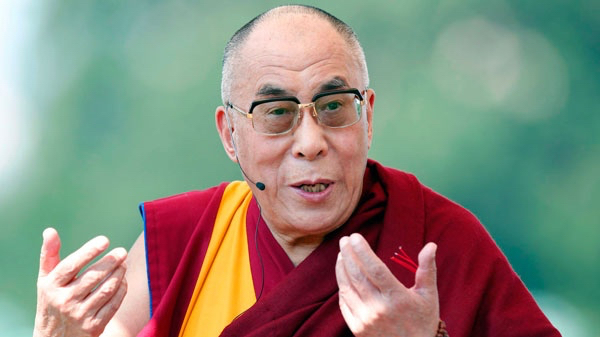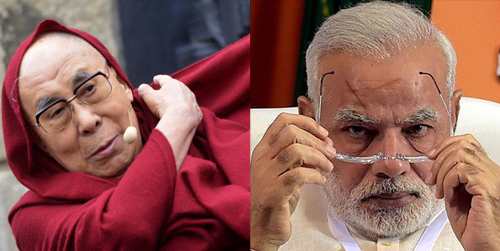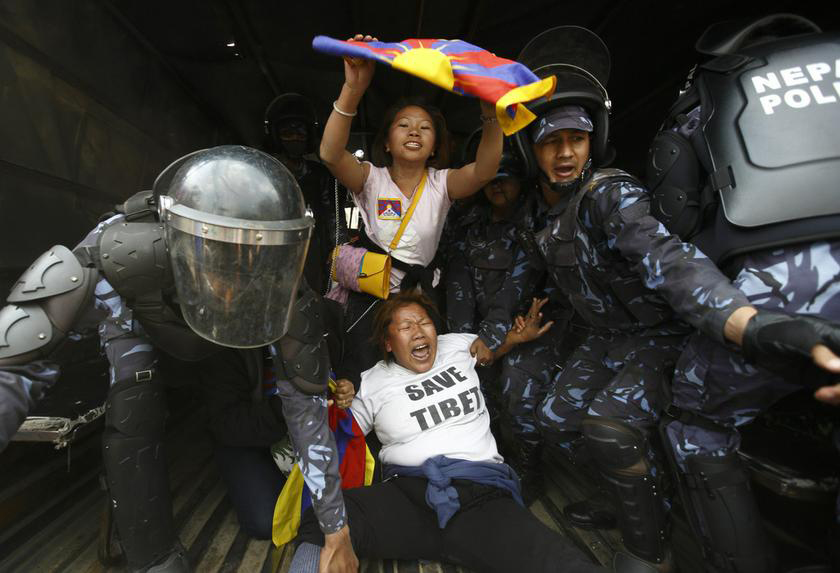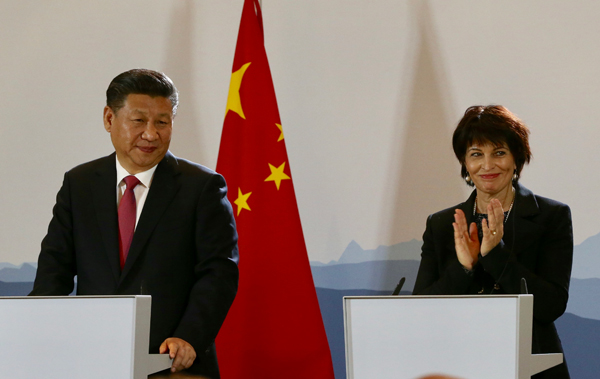Recent years have seen an increase in China’s global influence more than ever before and it has become apparent that China is now the world’s foremost superpower, exceeding even the United States of America. Knowing this, it would be foolhardy for countries in the region not to be part of this growth; logically, opposing China will simply bring about more loss than gain.
Friendship with the Chinese now signals prosperity, growth, profit and wealth. That kind of economic uptick is usually accompanied by an expansion in all areas of life, from infrastructure, housing and medical advancements to education and even protection from China’s military might. With that kind of potential, it is little wonder that so many countries are scrambling to get on China’s good side.

So interested are they in forging positive relationships with China, that some of these countries have even banned His Holiness the Dalai Lama from entering their borders, as Mongolia did in 2016. Furthermore, the Central Tibetan Administration’s bungling and blunders have offended many nations and they are fast losing the support of their allies.
Hence it is not surprising to see Nepal and even India taking the necessary steps to create a closer relationship with China, and distancing themselves from the “troublesome” Tibetan leadership. Some such recent events include:
- India banning Tibetans from holding rallies for Tibetan Uprising Day on March 10th in Delhi this year. This annual event commemorates the 1959 Tibetan uprising in Lhasa, and is a deeply significant event on the annual calendar of all Tibetans. Now that Tibetans are banned from commemorating the event with anti-China protests in Delhi, the capital and decision-making heart of India, it sends a strong signal to the world that India has changed its priorities. It is a clear indication that the Indian government is doing what they need to quickly mend their relationship with China for the sake of their future and the welfare of their 1.2 billion citizens. India is putting Indians first.
- A memo was circulated under the direction of India’s Foreign Secretary, Vijay Gokhale, discouraging Indian officials from attending the Central Tibetan Administration (CTA’s) events. The CTA are the Tibetan leadership in exile who are based in Dharamsala, and the memo is most definitely not in their favor. It is another major indication that India is starting to disassociate itself from the Tibetans in exile who have historically disrupted sensitive Sino-Indian ties. That is to say, officials in the higher echelons of the Indian government are recognizing there is no benefit to supporting the CTA, and they are starting to make it official with the issuance of memos.
- This memo explains the sudden change of venue for the CTA’s “Thank You India 2018” events. At the Indian government’s instruction, the CTA relocated from the high-profile Thyagaraj Sports Complex in Delhi to low-key Dharamsala. Clearly the Indian government do not want to be seen supporting the CTA by any measure, whether directly or indirectly such as by giving them permits, security clearances, etc. to host a major event in India’s capital city. In this embarrassing move for the CTA, India affirmed they are leaning towards saying “Yes!” to China and “No, thank you!” to the Tibetans.
- India is now seen to be treading more carefully with China on the Doklam border issue as they realize tackling China head-on is a fruitless endeavor and, in fact, nothing good can be gained from such a conflict. Not only would it cause an economic downturn in both countries, but precious lives would be lost on both sides and wars hardly have a history of resolving deeper issues. Despite India clearly indicating that they are adopting a conciliatory approach with China, the CTA keep rubbing salt into the wound with the self-aggrandizing Sikyong Lobsang Sangay constantly urging India to go against the Chinese. Thankfully India, with its long history of sophisticated diplomacy, is smart and treading carefully – up until this day, Prime Minister Modi has never met the Dalai Lama in an official capacity, being careful not to jeopardize India’s relationship with China.

Indian Prime Minister Modi has taken great care not to be seen with the Dalai Lama in an official capacity
- In 2005, Nepali authorities closed two important Tibetan offices in Kathmandu that were associated with the Dalai Lama. This should have been a huge wake-up call for the Tibetans but the CTA did not take the hint. Nepal closed the Office of the Dalai Lama’s Representative and the Tibetan Refugee Welfare Office, signaling a decline in regional support for the Tibetans and marking the beginning of the end of Nepal as a traditional Tibetan stronghold.
- Nepal has had enough with Tibetans thriving on their tourist industry, enjoying a good livelihood and earning millions but giving nothing back to help Nepal. Instead, Tibetan funds are only channelled towards Tibetan causes and the building of their golden monasteries. Nepal’s resentment reached new heights when a close associate of the Dalai Lama was caught money laundering from funds which were supposed to be used in rebuilding Nepal after the tragic earthquake in 2015.
- Nepal’s resentment has further escalated thanks to the Dalai Lama’s remarks about Buddha being Indian, which was deemed to be extremely insensitive and tactless. Thousands of Nepalis took to social media networks to express their disappointment and disgust at the Tibetan spiritual leader and the resulting uproar has sealed the fate of Tibetans as being the least popular of the country’s immigrant population.
- Another sign of the Tibetan community’s lowered standing in Nepal was the banning of all Tibetan Uprising Day activities, including protests and public gatherings. This is unsurprising given that previous years’ protests have caused chaos and violence, and bearing in mind Nepal’s increasingly close relationship with China.
- Most recently, China has revived its plans to establish itself in Lumbini through redevelopment efforts worth up to US$3 billion, including an international airport, railway facilities and a seminary-cum-monastery. As the Asian giant develops the birthplace of the Buddha, the fast-fading influence of the Dalai Lama on the Buddhist community will be further reduced and the CTA will no longer have a spokesperson to garner influence for the Tibetan cause.

Annual Tibetan Uprising Day protests have historically caused chaos and even violence in Nepal
These are just some of the more recent incidents in which both India and Nepal have had to tolerate the Tibetans, who are exploiting both the East and West for their own gains – having gathered sympathy from the West who pump in millions of dollars in aid to the Tibetan exiled community, the Tibetans are simultaneously taking advantage of India and Nepal’s goodwill too.
Not only do they fail to pay any taxes on these donations or contribute to the countries’ social welfare improvements, but Tibetans also berate and abuse their kind hosts for exhibiting a willingness to grow close to China.
Neither country should be faulted for wanting to have closer ties with the Chinese. They are entitled to have close ties with whomever they want, especially since it will help their respective nations to progress. Who does not want their country’s economy and citizens’ lives improved? Why should Nepal or India feel guilty for wanting to boost their economy and raise their people’s standards of living? The West is often quick to point the finger and judge, yet they do exactly the same; on the one hand, the West accuses China of human rights violations but on the other hand, their own human rights records are hardly spotless. All the while, they extend a hypocritical hand of friendship towards the Tibetans in exile and in the end, we hear of countries like Switzerland, which has the biggest population of Tibetan refugees in the West, aligning themselves with the One China policy. In fact, Switzerland outright rejected the applications of 300 Tibetan asylum seekers, telling them to return to the China-controlled Tibet Autonomous Region.

President Xi Jinping and Doris Leuthard, a member of the Swiss Federal Council.
As the inevitability of more countries aligning themselves with China draws closer, the fate of the CTA is bleak as they begin to lose their appeal all over the world and with their own people. Let’s face it — after 60 years in exile, what have the CTA achieved for the betterment of their people? All they have done is to fatten up the pockets of those in power. The CTA have shown time and again that they only operate according to their own rules, instead of abiding by the laws of their host country.
The sudden unjust termination of Penpa Tsering, the CTA’s former North American Representative, and the victimization of former Sikyong-candidate Lukar Jam shows just what the Tibetan leadership are capable of. If they can do this to high-profile, highly visible politicians, imagine what they have been doing to the average Tibetan refugee who has no power or authority, for instance Dorje Shugden practitioners who have suffered over 20 years of abuse, violence and discrimination at the hands of their own leadership.
It is clear that Tibetans will be much better off being friendly with China than hoping against hope that their sorry excuse for a leadership will finally get their act together and lead them to greener pastures. This leads to the million-dollar question: where do Tibetan people, especially those in exile, stand in their quest for a free Tibet? It seems like they are in limbo with no clear path, especially for those who cannot afford to migrate to the West. This is probably why the wisest thing for the CTA to do is to stop provoking China and to seriously start finding ways to gain China’s trust, if they wish to survive for another six decades and not end up in limbo — stateless people who are not citizens of either Tibet, China, India or Nepal. Those who remain in doubt should really read what Jayadeva Ranade, the President of the Centre for China Analysis and Strategy, has written in the Sunday Guardian below.

Click to enlarge. (Source: http://www.sundayguardianlive.com/news/13054-china-rises-nepal-eyes-lumbini)
MORE NEWS LIKE THIS